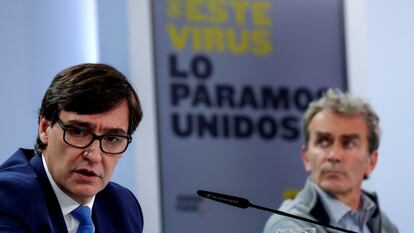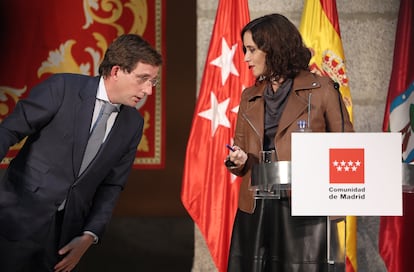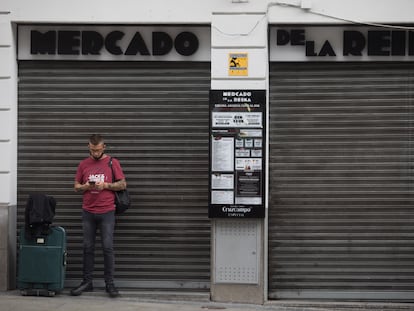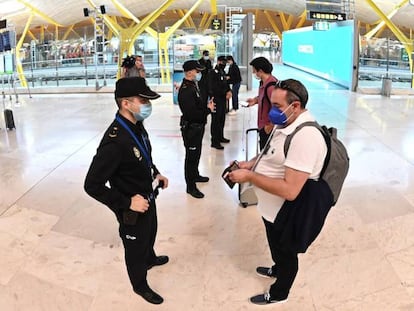Minister’s warning to Madrid government: ‘You can’t play with public health’
The ongoing battles between the two administrations continued last night, with regional premier Isabel Díaz Ayuso of the PP claiming Madrileños are being ‘held hostage’ by new coronavirus confinements

The ongoing tensions between the central government and the Madrid regional administration have changed the way that the Health Ministry’s regular press conferences about the coronavirus crisis are being held. Where once the director of the Health Ministry’s Coordination Center for Health Alerts (CCAES), Fernando Simón, would review the latest data in his usual deliberate and informative tone, the events have now become another element in the open warfare between the two governments.
On Tuesday evening, Health Minister Salvador Illa of the Socialist Party (PSOE) took advantage of the press conference to respond to statements that had just been made by the Madrid regional premier, Isabel Díaz Ayuso, and the mayor of the Spanish capital, José Luis Martínez-Almeida, both of the conservative Popular Party (PP).

The PP politicians on Tuesday called for the government to lift the state of alarm that it implemented in Madrid on Friday, after perimetral lockdowns that the region itself had introduced the week before, also imposed on it by the central administration, were quashed by the regional High Court. The coalition government – run by the PSOE and junior partner Unidas Podemos – had given Ayuso a deadline to introduce her own measures in a bid to slow the spread of the coronavirus in Madrid, which has once again become the epicenter of the crisis in Spain. After she missed that deadline, the Cabinet implemented the emergency situation in the region, allowing it to limit freedom of movement.
Ayuso and Martínez-Almeida argued last night that the data has improved in the region, and that in the capital, the 14-day cumulative number of coronavirus cases per 100,000 inhabitants has fallen to 400, while in the region the figure is 457. The regional premier and the mayor accused the central government of “holding as hostages” the citizens who reside in the nine Madrid municipalities – including the capital – that are currently subject to perimetral lockdowns. “They want to destroy our economy and put the brakes on our recovery,” Ayuso claimed on Tuesday night at the press conference.
“We once again call on the government to annul the state of alarm, which has been imposed on Madrid and another eight large cities in the region,” she continued. “This is a shoddy intervention against the economic engine of Spain.” She also described the government’s actions in Madrid as “a succession of attacks against rights and freedoms.”
While the data from Madrid is improving, the number of PCR tests being carried out in the region has fallen by 40%
The perimetral confinements, however, are exactly the same as those the region itself implemented in 45 basic healthcare areas several weeks ago. The difference is the scale and location, as well as the legal framework upon which they are based. There are also limits on social activities in place, such as early closing hours for bars and restaurants, as well as a maximum of six people allowed at meetings both in public and private. The perimetral lockdowns are in place in Alcobendas, Alcorcón, Fuenlabrada, Getafe, Leganés, Móstoles, Parla and Torrejón de Ardoz, as well as the Spanish capital.
“You cannot play with public health,” said Illa, in response to accusations from the PP politicians that the central government is trying to punish the Madrid region for political reasons. “We do not want people in the intensive care unit,” he said in reference to the alarming coronavirus data in Madrid.
“We need to act based on the healthcare situation,” the minister continued, making clear that bringing the 14-day cumulative number of coronavirus cases per 100,000 inhabitants under 500 cases, as Madrid has done, is still not a good situation. “Measures need to be taken from 60 cases onward,” he said, adding that anything above 250 cases constitutes a complicated situation. The German capital of Berlin, for example, last week began to implement new stricter social measures after four districts registered more than 50 cases per 100,000 inhabitants over the last seven days.
For his part, Fernando Simón added that the variables that were agreed upon several weeks ago by a majority of Spain’s regions before stricter measures must be implemented – more than 500 cases per 100,000 inhabitants, a PCR positivity rate of above 10% and 35% of ICU beds occupied by Covid-19 patients – were set “due to the exceptional circumstances” in Madrid, and that the desirable levels of these parameters “are much lower.”
Illa also made a veiled reference to the fact that while the data from Madrid is improving, the number of PCR tests being carried out in the region has fallen by 40%. “This worries me,” he said, after explaining that the increased use of antigen tests – which also diagnose positive cases – could not fully justify this fall. The result of carrying out fewer PCR tests is that fewer cases are diagnosed, leading to a fall in incidence.
The state of alarm is a shoddy intervention against the economic engine of SpainMadrid premier Isabel Díaz Ayuso
The remaining data released on Tuesday evening by the Health Ministry did not serve to offer much insight into the progress of the pandemic in Spain, apart from a certain stabilization in many indicators that can most likely be attributed to the long weekend – Monday was a national holiday.
The new cases reported in the previous 24 hours came in at 7,118, while the number of victims added to the overall death toll was 80 – both represent a slight fall compared to recent days. The 14-day cumulative number of coronavirus cases per 100,000 inhabitants is currently at 263 in Spain, while ICU admissions over the past week number 164. The number of victims over the same time frame is 406. None of these data points have varied greatly over the past few days.
“These continue to be incidences that are very high,” said Simón at Tuesday’s press conference. “There is a large variance between regions,” he added.
English version by Simon Hunter.









































